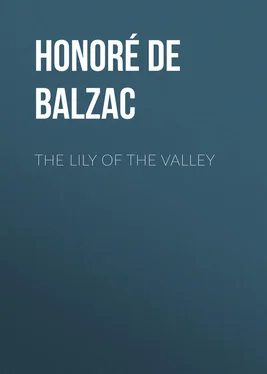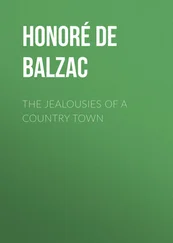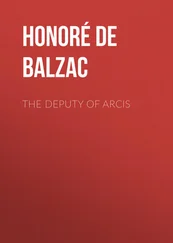Honoré Balzac - The Lily of the Valley
Здесь есть возможность читать онлайн «Honoré Balzac - The Lily of the Valley» — ознакомительный отрывок электронной книги совершенно бесплатно, а после прочтения отрывка купить полную версию. В некоторых случаях можно слушать аудио, скачать через торрент в формате fb2 и присутствует краткое содержание. Жанр: literature_19, foreign_antique, foreign_prose, на английском языке. Описание произведения, (предисловие) а так же отзывы посетителей доступны на портале библиотеки ЛибКат.
- Название:The Lily of the Valley
- Автор:
- Жанр:
- Год:неизвестен
- ISBN:нет данных
- Рейтинг книги:4 / 5. Голосов: 1
-
Избранное:Добавить в избранное
- Отзывы:
-
Ваша оценка:
- 80
- 1
- 2
- 3
- 4
- 5
The Lily of the Valley: краткое содержание, описание и аннотация
Предлагаем к чтению аннотацию, описание, краткое содержание или предисловие (зависит от того, что написал сам автор книги «The Lily of the Valley»). Если вы не нашли необходимую информацию о книге — напишите в комментариях, мы постараемся отыскать её.
The Lily of the Valley — читать онлайн ознакомительный отрывок
Ниже представлен текст книги, разбитый по страницам. Система сохранения места последней прочитанной страницы, позволяет с удобством читать онлайн бесплатно книгу «The Lily of the Valley», без необходимости каждый раз заново искать на чём Вы остановились. Поставьте закладку, и сможете в любой момент перейти на страницу, на которой закончили чтение.
Интервал:
Закладка:
Monsieur de Chessel gave my name and biography. I had lately arrived at Tours, where my parents had recalled me when the armies threatened Paris. A son of Touraine to whom Touraine was as yet unknown, she would find me a young man weakened by excessive study and sent to Frapesle to amuse himself; he had already shown me his estate, which I saw for the first time. I had just told him that I had walked from Tours to Frapesle, and fearing for my health – which was really delicate – he had stopped at Clochegourde to ask her to allow me to rest there. Monsieur de Chessel told the truth; but the accident seemed so forced that Madame de Mortsauf distrusted us. She gave me a cold, severe glance, under which my own eyelids fell, as much from a sense of humiliation as to hide the tears that rose beneath them. She saw the moisture on my forehead, and perhaps she guessed the tears; for she offered me the restoratives I needed, with a few kind and consoling words, which gave me back the power of speech. I blushed like a young girl, and in a voice as tremulous as that of an old man I thanked her and declined.
“All I ask,” I said, raising my eyes to hers, which mine now met for the second time in a glance as rapid as lightning, – “is to rest here. I am so crippled with fatigue I really cannot walk farther.”
“You must not doubt the hospitality of our beautiful Touraine,” she said; then, turning to my companion, she added: “You will give us the pleasure of your dining at Clochegourde?”
I threw such a look of entreaty at Monsieur de Chessel that he began the preliminaries of accepting the invitation, though it was given in a manner that seemed to expect a refusal. As a man of the world, he recognized these shades of meaning; but I, a young man without experience, believed so implicitly in the sincerity between word and thought of this beautiful woman that I was wholly astonished when my host said to me, after we reached home that evening, “I stayed because I saw you were dying to do so; but if you do not succeed in making it all right, I may find myself on bad terms with my neighbors.” That expression, “if you do not make it all right,” made me ponder the matter deeply. In other words, if I pleased Madame de Mortsauf, she would not be displeased with the man who introduced me to her. He evidently thought I had the power to please her; this in itself gave me that power, and corroborated my inward hope at a moment when it needed some outward succor.
“I am afraid it will be difficult,” he began; “Madame de Chessel expects us.”
“She has you every day,” replied the countess; “besides, we can send her word. Is she alone?”
“No, the Abbe de Quelus is there.”
“Well, then,” she said, rising to ring the bell, “you really must dine with us.”
This time Monsieur de Chessel thought her in earnest, and gave me a congratulatory look. As soon as I was sure of passing a whole evening under that roof I seemed to have eternity before me. For many miserable beings to-morrow is a word without meaning, and I was of the number who had no faith in it; when I was certain of a few hours of happiness I made them contain a whole lifetime of delight.
Madame de Mortsauf talked about local affairs, the harvest, the vintage, and other matters to which I was a total stranger. This usually argues either a want of breeding or great contempt for the stranger present who is thus shut out from the conversation, but in this case it was embarrassment. Though at first I thought she treated me as a child and I envied the man of thirty to whom she talked of serious matters which I could not comprehend, I came, a few months later, to understand how significant a woman’s silence often is, and how many thoughts a voluble conversation masks. At first I attempted to be at my ease and take part in it, then I perceived the advantages of my situation and gave myself up to the charm of listening to Madame de Mortsauf’s voice. The breath of her soul rose and fell among the syllables as sound is divided by the notes of a flute; it died away to the ear as it quickened the pulsation of the blood. Her way of uttering the terminations in “i” was like a bird’s song; the “ch” as she said it was a kiss, but the “t’s” were an echo of her heart’s despotism. She thus extended, without herself knowing that she did so, the meaning of her words, leading the soul of the listener into regions above this earth. Many a time I have continued a discussion I could easily have ended, many a time I have allowed myself to be unjustly scolded that I might listen to those harmonies of the human voice, that I might breathe the air of her soul as it left her lips, and strain to my soul that spoken light as I would fain have strained the speaker to my breast. A swallow’s song of joy it was when she was gay! – but when she spoke of her griefs, a swan’s voice calling to its mates!
Madame de Mortsauf’s inattention to my presence enabled me to examine her. My eyes rejoiced as they glided over the sweet speaker; they kissed her feet, they clasped her waist, they played with the ringlets of her hair. And yet I was a prey to terror, as all who, once in their lives, have experienced the illimitable joys of a true passion will understand. I feared she would detect me if I let my eyes rest upon the shoulder I had kissed, and the fear sharpened the temptation. I yielded, I looked, my eyes tore away the covering; I saw the mole which lay where the pretty line between the shoulders started, and which, ever since the ball, had sparkled in that twilight which seems the region of the sleep of youths whose imagination is ardent and whose life is chaste.
I can sketch for you the leading features which all eyes saw in Madame de Mortsauf; but no drawing, however correct, no color, however warm, can represent her to you. Her face was of those that require the unattainable artist, whose hand can paint the reflection of inward fires and render that luminous vapor which defies science and is not revealable by language – but which a lover sees. Her soft, fair hair often caused her much suffering, no doubt through sudden rushes of blood to the head. Her brow, round and prominent like that of Joconda, teemed with unuttered thoughts, restrained feelings – flowers drowning in bitter waters. The eyes, of a green tinge flecked with brown, were always wan; but if her children were in question, or if some keen condition of joy or suffering (rare in the lives of all resigned women) seized her, those eyes sent forth a subtile gleam as if from fires that were consuming her, – the gleam that wrung the tears from mine when she covered me with her contempt, and which sufficed to lower the boldest eyelid. A Grecian nose, designed it might be by Phidias, and united by its double arch to lips that were gracefully curved, spiritualized the face, which was oval with a skin of the texture of a white camellia colored with soft rose-tints upon the cheeks. Her plumpness did not detract from the grace of her figure nor from the rounded outlines which made her shape beautiful though well developed. You will understand the character of this perfection when I say that where the dazzling treasures which had so fascinated me joined the arm there was no crease or wrinkle. No hollow disfigured the base of her head, like those which make the necks of some women resemble trunks of trees; her muscles were not harshly defined, and everywhere the lines were rounded into curves as fugitive to the eye as to the pencil. A soft down faintly showed upon her cheeks and on the outline of her throat, catching the light which made it silken. Her little ears, perfect in shape, were, as she said herself, the ears of a mother and a slave. In after days, when our hearts were one, she would say to me, “Here comes Monsieur de Mortsauf”; and she was right, though I, whose hearing is remarkably acute, could hear nothing.
Читать дальшеИнтервал:
Закладка:
Похожие книги на «The Lily of the Valley»
Представляем Вашему вниманию похожие книги на «The Lily of the Valley» списком для выбора. Мы отобрали схожую по названию и смыслу литературу в надежде предоставить читателям больше вариантов отыскать новые, интересные, ещё непрочитанные произведения.
Обсуждение, отзывы о книге «The Lily of the Valley» и просто собственные мнения читателей. Оставьте ваши комментарии, напишите, что Вы думаете о произведении, его смысле или главных героях. Укажите что конкретно понравилось, а что нет, и почему Вы так считаете.












